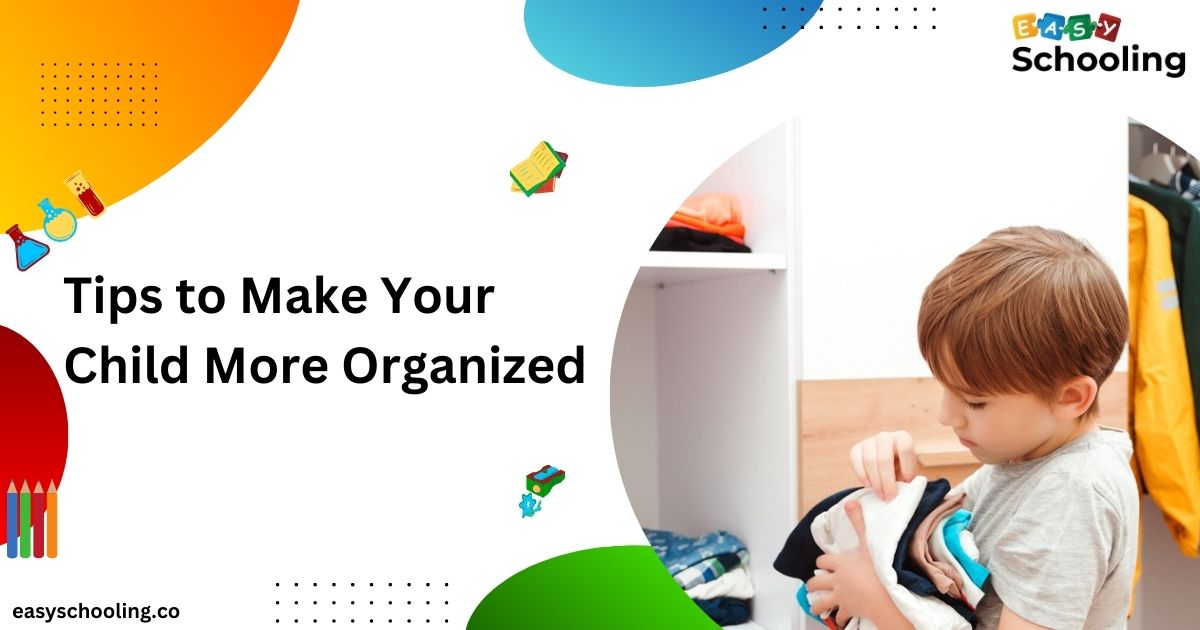At the core of successful child development lies the crucial ability to stay organized. The capacity to manage tasks, time, and responsibilities is a pivotal skill that not only aids in academic pursuits but also lays the foundation for a balanced and fulfilling life. To nurture this skill in children, several proven strategies and parenting tips can be employed, ensuring their growth into well-rounded individuals with exceptional organizational abilities.
Model Organization Habits
Modeling organizational behaviors is an instrumental method to instill this trait in children. Parents and guardians serve as primary role models for their young ones. By showcasing structured routines, maintaining tidy spaces, and demonstrating effective time management, adults can impart invaluable lessons about organization. Children observe, emulate, and absorb habits from their immediate environment, making the demonstration of organized behavior pivotal in their learning process.
Establish Consistent Routines
The establishment of consistent routines forms a cornerstone in nurturing organizational skills. Structured daily schedules imbue children with a sense of predictability and stability, allowing them to comprehend and prepare for upcoming tasks. Encourage the creation of a schedule that integrates study time, playtime, chores, and other activities. Consistency in these routines helps in fostering a habit of organization that becomes ingrained in their daily lives.
Utilize Visual Aids and Planners
Incorporating visual aids and planners significantly aids children in comprehending and managing their responsibilities. Visual representations, such as charts or planners, serve as effective tools to outline tasks and deadlines, offering a clear overview of their obligations. Encourage the use of colorful charts or digital planners that resonate with your child’s preferences, making the organizational process engaging and enjoyable.
Teach Time Management Skills
Teaching time management is paramount in fostering organizational abilities and parenting tips. Educate children on the importance of prioritizing tasks, breaking down assignments into manageable segments, and adhering to deadlines. Implement techniques like setting timers for various activities, teaching them the value of allocating appropriate time to each task, and the significance of completing tasks promptly.
Declutter and Organize Spaces
A clutter-free environment is conducive to enhancing organizational skills in children. Encourage regular decluttering sessions wherein children actively participate in organizing their belongings. Teach them the significance of categorizing items and maintaining tidy spaces, facilitating easy access to essentials and minimizing distractions during tasks.
Encourage Responsibility and Independence
Promoting responsibility and independence empowers children to take charge of their organizational endeavors. Assign age-appropriate tasks and responsibilities, allowing them to manage their assignments, keep track of their belongings, and make decisions regarding their routines. This fosters a sense of accountability, self-discipline, and autonomy, vital components of organizational skills.
Provide Encouragement and Positive Reinforcement
Offering encouragement and positive reinforcement are pivotal in nurturing organizational habits. Acknowledge and appreciate their efforts in staying organized. Positive reinforcement, such as verbal praise or small rewards, reinforces the importance and benefits of being organized, motivating them to continue practicing these habits.
Encouraging Adaptability and Flexibility
In addition to structured routines, fostering adaptability and flexibility is vital in promoting organizational skills. Teach children to adapt to unexpected changes in schedules or plans. Encourage them to navigate alterations with a positive mindset, emphasizing the importance of flexibility in managing various tasks and situations.
Promote Goal Setting
Introducing goal-setting techniques aids in cultivating organizational skills, this is another parenting tips for kids. Teach children how to set achievable short-term and long-term goals. Encourage them to break down larger objectives into smaller, manageable tasks, enabling them to track progress and feel a sense of accomplishment upon completion.
Engage in Problem-Solving Activities
Engaging children in problem-solving activities sharpens their organizational abilities. Encourage puzzles, brain teasers, or interactive games that require strategy, planning, and parenting tips. Such activities stimulate critical thinking, enabling children to approach challenges methodically and develop effective problem-solving skills.
Foster Effective Communication
Effective communication skills are intertwined with organizational abilities. Encourage open dialogue wherein children can express their thoughts, needs, and concerns. Effective communication fosters clarity, allowing them to articulate their plans and requirements while collaborating with others, an essential skill in organizational success.
Lead by Encouragement, Not Pressure
While nurturing organizational skills, it’s crucial to lead by encouragement rather than exerting unnecessary pressure. Maintain a supportive environment that fosters growth and learning. Avoid overwhelming children with expectations, instead emphasize progress and effort, cultivating a positive attitude towards the organization.
Encourage Reflective Practices
Encouraging reflective practices aids in refining organizational habits. Prompt children to reflect on their daily routines and strategies. Help them recognize what worked well and areas for improvement. Encouraging self-reflection fosters self-awareness, empowering children to adapt and refine their organizational techniques.
Emphasize the Value of Planning
Highlighting the value of planning instills a sense of purpose and direction. Demonstrate how planning can save time and prevent last-minute stress. Encourage children to anticipate upcoming events or tasks, preparing in advance and reinforcing the importance of foresight and preparation.
Encourage Collaboration and Teamwork
Promoting collaboration and teamwork cultivates organizational skills in social settings. Engage children in group activities or projects where they can collaborate with peers. Working together towards a common goal teaches cooperation, coordination, and effective task allocation – crucial elements of organizational success.
See More: Top 25 Tips for Effective Parenting
Conclusion
Cultivating organizational skills in children is an invaluable investment in their future. By adopting and implementing these proven strategies, and parenting tips, parents and guardians can significantly contribute to their child’s development. Through modeling, consistent routines, visual aids, time management lessons, decluttering spaces, fostering responsibility, and providing encouragement, children can thrive and excel in honing their organizational abilities.
In essence, the foundation for a child’s organizational skills begins at home, shaped by the environment, guidance, and opportunities provided by caregivers. Learn more from EasySchooling.
